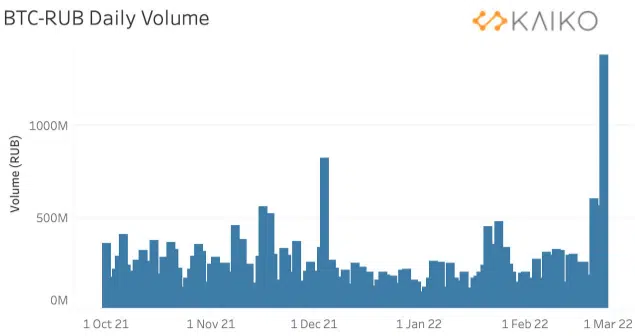Since Russia launched a war on Ukraine, the country’s financial system has come under increasingly harsh sanctions. Virtually all banks in Russia have been banned from transacting with most western nations. Additionally, Russia’s financial system has been partially removed from the SWIFT network.
Despite these sanctions on its financial system and economy, Russian banks have continued to operate relatively smoothly. The Russian Central Bank recently said the economy had enough liquidity in a bid to mitigate against a possible bank run. However, not everyone is as confident in the future of the Russian financial system as the central bank. This has been shown by the growing volume of BTC purchases in Russia.
Russia’s Bitcoin Volumes Are Surging
A quick check of Ruble BTC volumes on Binance shows that there has been a spike in Ruble BTC purchases in the past few days. Volumes reached 1.5 billion Ruble on Thursday, February 24, 2022, which is the highest in the past 10 months.
According to recent metrics shared by Kaiko, BTC/RUB trading volumes across exchanges saw a massive surge after Russia started invading Ukraine. We are seeing the biggest spike in volume right after sanctions were imposed on Russian banks.

Even before the conflict, Russians were already significant holders of crypto. It is estimated that they hold nearly 12% of all crypto assets globally by market cap. The first time Russians rushed to crypto was in 2014 after the national currency tumbled.
Most of the trading in Ruble to BTC has been focused on the Binance exchange. However, it is not just Russians buying up Bitcoin, Ukrainians have been doing so as well. Data shows that the Ukrainian hryvnia BTC volumes have also spiked on Binance.
The Role Of Crypto In Conflict Zones
Bitcoin is increasingly proving popular in regions of the world experiencing geopolitical issues. One good example of this is Turkey, where the country’s national currency has lost most of its value in recent months. In response, Turks have been buying up Bitcoin as a hedge against inflation. The same is true for Venezuela, after the collapse of the country’s national currency, most people simply began trading in Bitcoin. In response, the government tried to launch a national digital currency. However, most citizens were suspicious of the government using it to spy on citizens.
Another place where the use of crypto has been rising is Iran. The country, whose economy has come under severe sanctions, has increasingly come to embrace crypto. Today, Iran hosts some of the biggest BTC mining farms due to its cheap power supply.
The role of crypto in conflict zones was recently bolstered after Ukraine’s government requested donations in crypto. Within a few hours of posting its crypto address online, the address had received over $8 million in crypto. Funds sent to the address continue to rise.
Summary
As sanctions continue to hit the Russian financial system, more citizens will likely turn to BTC and other crypto coins. However, state organizations will still need to transact using fiat currencies. Thus far, the sanctions do not appear to have affected how Russians transact. However, that could change the longer sanctions are in place.
Nevertheless, it shows the power of crypto to help ordinary people continue living their lives amidst a far-reaching geopolitical conflict, which has seen the Ruble lose around 30% of its valuation in a few days. For those who were lucky to have converted their holdings into BTC, they were likely able to hedge against this inflation.
Notice: Information contained herein is not and should not be construed as an offer, solicitation, or recommendation to buy or sell securities. The information has been obtained from sources we believe to be reliable; however, no guarantee is made or implied with respect to its accuracy, timeliness, or completeness. Authors may own the cryptocurrency they discuss. The information and content are subject to change without notice. Visionary Financial and its affiliates do not provide investment, tax, legal, or accounting advice.
This material has been prepared for informational purposes only and is the opinion of the author, and is not intended to provide, and should not be relied on for, investment, tax, legal, accounting advice. You should consult your own investment, tax, legal, and accounting advisors before engaging in any transaction. All content published by Visionary Financial is not an endorsement whatsoever. Visionary Financial was not compensated to submit this article Please also visit our Privacy policy; disclaimer; and terms and conditions page for further information.

